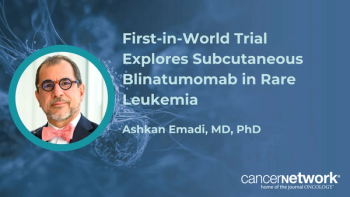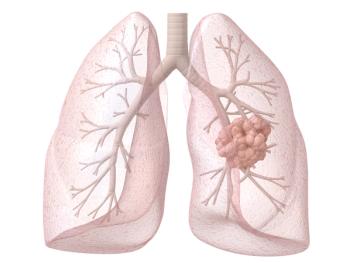
Oncology NEWS International
- Oncology NEWS International Vol 10 No 7
- Volume 10
- Issue 7
Glutamine Reduces the Severity of Paclitaxel-Induced Peripheral Neuropathy
SAN FRANCISCO-Glutamine appears useful in preventing taxane-induced neuropathies, according to Linda T. Vahdat, MD, assistant professor of medical oncology at Columbia University’s College of Physicians & Surgeons in New York City. A short course of oral glutamine given after high-dose paclitaxel (Taxol) significantly reduced the severity of peripheral neuropathy compared to prior patients who did not receive glutamine in a pilot study. Glutamine has also been under study for prevention of gastrointestinal toxicities associated with camptothecins.
SAN FRANCISCOGlutamine appears useful in preventing taxane-induced neuropathies, according to Linda T. Vahdat, MD, assistant professor of medical oncology at Columbia University’s College of Physicians & Surgeons in New York City. A short course of oral glutamine given after high-dose paclitaxel (Taxol) significantly reduced the severity of peripheral neuropathy compared to prior patients who did not receive glutamine in a pilot study. Glutamine has also been under study for prevention of gastrointestinal toxicities associated with camptothecins.
Dr. Vahdat told Oncology News International that glutamine will be studied further in a randomized, controlled trial of 80 patients with a history of paclitaxel-induced peripheral neuropathies. This trial is expected to open in late summer and enroll mainly breast cancer patients. The protocol will differ from the pilot study in that glutamine or placebo will be given beginning on the first day of paclitaxel administration, rather than after completion of paclitaxel, and will continue for 9 weeks.
"Peripheral neuropathy limits the usefulness of many newer chemotherapeutic agents such as the taxanes," Dr. Vahdat explained. "In this study we report on the possible successful reduction of peripheral neuropathy with glutamine administration after high-dose paclitaxel."
Paired Evaluations
Patients in the study received a high-dose chemotherapy protocol, with the first high-dose cycle being paclitaxel at 825 mg/m2 given over 24 hours. All patients had complete neurologic examinations and nerve conduction studies at baseline and at least 2 weeks after paclitaxel.
The first cohort of patients did not receive glutamine. The second cohort received glutamine at 10 g po TID for 4 days starting 24 hours after completion of paclitaxel.
Dr. Vahdat reported on paired evaluations, before and after receiving paclitaxel, of 33 patients who did not receive glutamine and 12 patients who did. The median interval between the evaluations was 32 days.
Glutamine-treated patients had significantly less peripheral neuropathy as measured by development of moderate to severe dysesthesias and numbness in the fingers and toes (P < 0.05). These patients were also less likely to have transient motor weakness (56% vs 25%, P = 0.04) or deterioration in gait (85% vs 45%, P = 0.016). Glutamine-treated patients also reported dramatically less interference with activities of daily living (85% vs 27%, P = 0.001). Glutamine was associated with a nonsignificant trend toward a reduced incidence of moderate to severe paresthesias in the fingers (55% vs 42%) and toes ( 64% vs 50%). All of these toxicities were reversible over time.
"We suspect that glutamine alters nerve growth factor levels and that this mediates the neuroprotective effect," Dr. Vahdat said.
Articles in this issue
over 24 years ago
NCI to Expand Its Support for Trials of STI-571over 24 years ago
Patients and Physicians Differ on Chemotherapy Expectationsover 24 years ago
Concurrent Chemoradiotherapy Helps Preserve Larynxover 24 years ago
FDA Issues New Safeguards for Children in Clinical Trialsover 24 years ago
Leukemia Society Offers Patient Information on Use of STI-571Newsletter
Stay up to date on recent advances in the multidisciplinary approach to cancer.










































